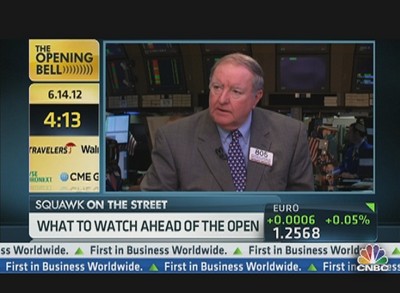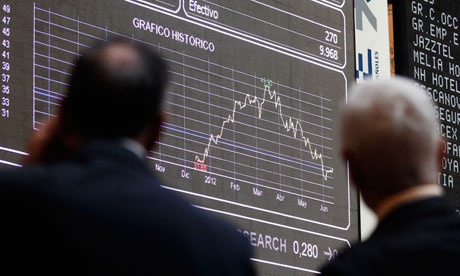
José Manuel Barroso at the G20 summit. Photograph: Bertrand Langlois/AFP/Getty Images
The opening day of the G20 summit was threatening to deteriorate into a fractious row between eurozone countries and other non-European members of the G20, notably the US, as EU commission president José Manuel Barroso insisted the origins of the eurozone crisis lay in the unorthodox policies of American capitalism.
As Europe's leaders came under intense pressure to act decisively to cure the euro's ills, and a campaign gathered pace to relax some of the austerity programmes laying waste to countries with unsustainable debt levels, Barroso said Europe had not come to the G20 summit in Mexico to receive lessons on how to handle the economy. Asked by a Canadian journalist: "Why should North Americans risk their assets to help Europe?" he replied: "Frankly, we are not here to receive lessons in terms of democracy or in terms of how to handle the economy.
"This crisis was not originated in Europe … seeing as you mention North America, this crisis originated in North America and much of our financial sector was contaminated by, how can I put it, unorthodox practices, from some sectors of the financial market."
Late on Monday , Antonis Samaras, the Greek election victor, announced he had agreed to build a coalition with the head of the socialist Pasok, Evangelos Venizelos, with aides saying they expected negotiations to be concluded by Tuesday. The moderate Democratic Left party may participate as well.
The European council's president Herman Van Rompuy, speaking alongside Barroso, said a draft G20 communique showed "support and encouragement for the euro area countries and leaders and for the European Union as a whole to overcome this crisis".
"We are not the only ones that are so-called responsible for the current economic problems all over the world," he said.
Germany's chancellor, Angela Merkel, is under pressure to soften her hardline stance on the austerity measures Europe imposed on indebted eurozone members, which the British chancellor George Osborne has claimed has killed economic growth. Barroso said he expected G20 leaders to "speak very clearly in favor of the approach the EU is following."
After the Greek election at the weekend, which may have shifted terms of the debate over how to shore up the euro, world leaders meeting in Mexico focused on the European crisis amid strong signs of big trouble brewing in Spain.
Madrid's 10-year cost of borrowing went through the 7% barrier on the bond markets for the first time in the single currency era, the level at which borrowing becomes unaffordable. The Spanish government demanded intervention from the European Central Bank.
Spain's prime minister, Mariano Rajoy, is expected to ask for up to €100bn in eurozone bailout funds for Spain's stricken banks at a meeting of eurozone finance ministers in Luxembourg on Thursday, senior Eurogroup sources said. Voicing exasperation with the European response to the debt crisis, Robert Zoellick, the outgoing American head of the World Bank, warned the G20 summit in Mexico of a growing rift between the Europeans in charge of the bailouts and the IMF.
"The world's waiting for the Europeans to say what they want to do," said Zoellick. He predicted a showdown between the IMF and Europe by the end of the summer in the absence of any decisive action.
Barack Obama was expected to press Merkel, in Mexico on Monday night on the issue of eurobonds – the pooling of liability for single currency countries' debt. But there is no chance of Merkel agreeing to underwrite the debt of other European countries for the foreseeable future.
Britain might have to seek fresh export markets outside the EU as the euro crisis was now facing such entrenched political obstacles that it could be impossible to resolve, he warned. "It may be that the eurozone crisis is going to continue for some time, in which case the UK must do all it can to put its own house in order and link up with the fastest growing parts of the world."
He said a longer term roadmap for a more stable single currency was going to be hard to achieve.
Fresh from his victory in the Greek election, the centre-right leader, Antonis Samaras, promptly tabled demands for a softening of the draconian austerity programme that Greece has to implement for the eurozone bailout.
Samaras, the prime minister-designate pledged to stick broadly to the Greek bailout terms but added: "We will simultaneously have to make some necessary amendments to the bailout agreement, in order to relieve the people of crippling unemployment and huge hardships."
Politicians and officials in Brussels and Germany appeared to suggest that the new Greek leader's demands could be at least partly satisfied by extending the repayment schedule on the bailout loans or lengthening the target deadlines for cutting the budget deficit.
There were also reports that the terms underpinning Ireland's bailout could also be relaxed, giving Dublin a much longer repayment schedule on the loans. The talk of rescheduling the Greek bailout terms surfaced quickly on Sunday night, with the German foreign minister, Guido Westerwelle, suggesting the Europeans could alter the timings. That triggered a row in Germany among the political class over the pros and cons of going easier on Greece.
In Brussels, the respected Bruegel thinktank said: "It is now increasingly clear that the [Greek] programme is severely off track. The [Samaras] victory doesn't change this fact and it has become unavoidable to open a discussion about the shape and form of a new Greek programme. This is a fact now broadly acknowledged by policymakers and in particular by German officials who have openly discussed the possibility of stretching fiscal targets."
Martin Schulz, the German social democrat who presides over the European parliament, added: "The new Greek government will be able to count on our constructive cooperation in possible fine-tuning of its reform strategy and economic targets. If Greece sticks to its commitments, the EU can examine what could be done further to solve the crisis."
From Mexico, however, Merkel appeared to dismiss any easing of the Greek conditions. "The new Greek government has to implement the commitments entered into by the country. The programme framework has to be kept."
The eurogroup source said that Samaras was expected to show up in Luxembourg on Thursday for the meeting of eurozone finance ministers which will grapple with Spain and how to respond to the Greek election results.
As Europe's leaders came under intense pressure to act decisively to cure the euro's ills, and a campaign gathered pace to relax some of the austerity programmes laying waste to countries with unsustainable debt levels, Barroso said Europe had not come to the G20 summit in Mexico to receive lessons on how to handle the economy. Asked by a Canadian journalist: "Why should North Americans risk their assets to help Europe?" he replied: "Frankly, we are not here to receive lessons in terms of democracy or in terms of how to handle the economy.
"This crisis was not originated in Europe … seeing as you mention North America, this crisis originated in North America and much of our financial sector was contaminated by, how can I put it, unorthodox practices, from some sectors of the financial market."
Late on Monday , Antonis Samaras, the Greek election victor, announced he had agreed to build a coalition with the head of the socialist Pasok, Evangelos Venizelos, with aides saying they expected negotiations to be concluded by Tuesday. The moderate Democratic Left party may participate as well.
The European council's president Herman Van Rompuy, speaking alongside Barroso, said a draft G20 communique showed "support and encouragement for the euro area countries and leaders and for the European Union as a whole to overcome this crisis".
"We are not the only ones that are so-called responsible for the current economic problems all over the world," he said.
Germany's chancellor, Angela Merkel, is under pressure to soften her hardline stance on the austerity measures Europe imposed on indebted eurozone members, which the British chancellor George Osborne has claimed has killed economic growth. Barroso said he expected G20 leaders to "speak very clearly in favor of the approach the EU is following."
After the Greek election at the weekend, which may have shifted terms of the debate over how to shore up the euro, world leaders meeting in Mexico focused on the European crisis amid strong signs of big trouble brewing in Spain.
Madrid's 10-year cost of borrowing went through the 7% barrier on the bond markets for the first time in the single currency era, the level at which borrowing becomes unaffordable. The Spanish government demanded intervention from the European Central Bank.
Spain's prime minister, Mariano Rajoy, is expected to ask for up to €100bn in eurozone bailout funds for Spain's stricken banks at a meeting of eurozone finance ministers in Luxembourg on Thursday, senior Eurogroup sources said. Voicing exasperation with the European response to the debt crisis, Robert Zoellick, the outgoing American head of the World Bank, warned the G20 summit in Mexico of a growing rift between the Europeans in charge of the bailouts and the IMF.
"The world's waiting for the Europeans to say what they want to do," said Zoellick. He predicted a showdown between the IMF and Europe by the end of the summer in the absence of any decisive action.
Barack Obama was expected to press Merkel, in Mexico on Monday night on the issue of eurobonds – the pooling of liability for single currency countries' debt. But there is no chance of Merkel agreeing to underwrite the debt of other European countries for the foreseeable future.
Britain might have to seek fresh export markets outside the EU as the euro crisis was now facing such entrenched political obstacles that it could be impossible to resolve, he warned. "It may be that the eurozone crisis is going to continue for some time, in which case the UK must do all it can to put its own house in order and link up with the fastest growing parts of the world."
He said a longer term roadmap for a more stable single currency was going to be hard to achieve.
Fresh from his victory in the Greek election, the centre-right leader, Antonis Samaras, promptly tabled demands for a softening of the draconian austerity programme that Greece has to implement for the eurozone bailout.
Samaras, the prime minister-designate pledged to stick broadly to the Greek bailout terms but added: "We will simultaneously have to make some necessary amendments to the bailout agreement, in order to relieve the people of crippling unemployment and huge hardships."
Politicians and officials in Brussels and Germany appeared to suggest that the new Greek leader's demands could be at least partly satisfied by extending the repayment schedule on the bailout loans or lengthening the target deadlines for cutting the budget deficit.
There were also reports that the terms underpinning Ireland's bailout could also be relaxed, giving Dublin a much longer repayment schedule on the loans. The talk of rescheduling the Greek bailout terms surfaced quickly on Sunday night, with the German foreign minister, Guido Westerwelle, suggesting the Europeans could alter the timings. That triggered a row in Germany among the political class over the pros and cons of going easier on Greece.
In Brussels, the respected Bruegel thinktank said: "It is now increasingly clear that the [Greek] programme is severely off track. The [Samaras] victory doesn't change this fact and it has become unavoidable to open a discussion about the shape and form of a new Greek programme. This is a fact now broadly acknowledged by policymakers and in particular by German officials who have openly discussed the possibility of stretching fiscal targets."
Martin Schulz, the German social democrat who presides over the European parliament, added: "The new Greek government will be able to count on our constructive cooperation in possible fine-tuning of its reform strategy and economic targets. If Greece sticks to its commitments, the EU can examine what could be done further to solve the crisis."
From Mexico, however, Merkel appeared to dismiss any easing of the Greek conditions. "The new Greek government has to implement the commitments entered into by the country. The programme framework has to be kept."
The eurogroup source said that Samaras was expected to show up in Luxembourg on Thursday for the meeting of eurozone finance ministers which will grapple with Spain and how to respond to the Greek election results.




















